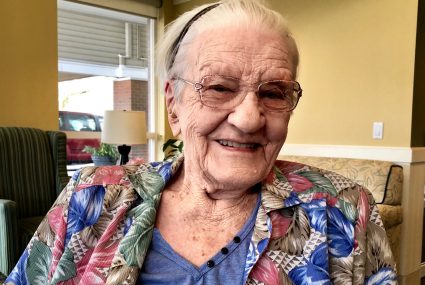In celebration of International Women’s Day on March 8, Bria Communities seniors’ residences in the Lower Mainland are celebrating the achievements of the women who live and work in our residences. Started in the 1900s by The Suffragettes, International Women’s Day had its first celebration in 1911, and is now a global movement of advocacy, activism and support. Today we’re celebrating Magnolia Gardens resident, Lillian Tuningley.
Lillian Tuningley’s father always advised her that money was the root of all evil. Today, on the brink of her 100 birthday, Lillian has lived through the Great Depression, the Second World War, economic upswings, and downturns. She’s experienced lack, and she’s experienced abundance—and this is what she tells her own children: “Money is not important.”
Born in 1918 in a small town in Saskatchewan, there was never very much money. She vividly recalls the first pair of shoes she owned; purchased when she was in grade five. “Before that, I wore rabbit skin. We never had money, but I had a wonderful life.”
She loved school, and the little red schoolhouse that she attended until grade eight was one of her favourite places. After grade eight the family needed money and Lil was sent to work. At 13 years-old she started cooking breakfast and lunch for 21 men who worked at a local pig and grain farm. “Every Saturday they’d bring me 100 lbs. of flour. I made bread, and I always made cinnamon buns. We had lots of bacon and eggs for breakfast. In the middle of the afternoon, I would load up the buggy or go on horseback and take lunch out to them. I did it by myself for three years!”
She worked hard during the day and made $10 a week. In the evenings she continued her education. “After grade eight you took correspondence, and your work was sent to Regina. Exams were written in a town high school. That is how I got through high school.”
Lil married her sweetheart Jim at 18. They farmed a piece of land purchased from the Hudson’s Bay Company for $2,700. “We gave them one-third of the crop for six years and sold it for $2,200. It was the worst investment we made.” Even as she remembers these hard times, she concludes, “It was a good life, and we were happy.”
Their first child was born in 1938, and World Word II started in 1939. Jim enlisted and found himself on the Italian campaign, where as a quartermaster, he delivered food to the men on the front lines. It was there he became quite ill, the effects followed him the rest of his life. A son was born in 1946, and the next year they moved to Burnaby, close to Jim’s family. It was a difficult move for Lil, “I cried buckets the first year and would have walked back if I didn’t have two kids.”
Money was tight in the years that followed. Jim went from job to job and after a third child was born Lillian found opportunities to bring in extra income by doing laundry or caring for an elderly friend. “I always told the kids that there was nothing wrong with being poor. We were poor, but we were honest!” Lil laughs as she recounts the story of how her 11-year-old son slept in the ditch outside their house in order meet the newspaper truck at dawn and get a paper route. “They were hard times, but happy,” she writes in the journal she’s kept since she was 10.
Lillian’s life changed one night over a meal of macaroni and venison. The kids complained that there was no cheese. “I told them that when we had more money, we would have cheese, and perhaps I should try to find another job. Allen laughed and said, ‘what can you do Mom?’ It really hit hard that he should think housework was all I could do.”
A family friend said to her, ‘You’re pretty smart Lil. Why don’t you apply for a government job?’ Shortly after that, she got a job with Simon Fraser Health Unit., that was the beginning of a 40-year career with Fraser Health. She enjoyed her post and the people she worked with and had a particular affection for her boss, the physiotherapy department. He kept flowers on her desk, and she wrote letters to his parents in England updating them on his activities.
One week her boss asked a special favour—he was bidding on a piece of property on Bowen Island but had to make an emergency trip to England. He asked Lil and Jim to visit Bowen Island and bid on his behalf. They did, and in the process fell in love with the little island that is a 20-minute ferry ride out of Horseshoe Bay. In 1973, they bought a lot advertised as ‘the best lot on Bowen’, and that’s how Lil became the owner of Lil’s Bed and Breakfast.
“I never planned on having a B&B, but anyone missing the last ferry was sent to our place,” she remembers fondly. One such couple were publishers of a Bed and Breakfast listing, and they encouraged Lil to apply for a permit and to advertise. “We had people from England, Australia, New Zealand and Japan. Government, highways and telephone personnel were glad to have a place to stay. Paramount Studios made many movies on Bowen, and they paid well. At that time Lil’s was the only B&B.” She fondly recalls guests from around the world, and one particularly stands out.
“He stayed with us for two months as he was working for National Geographic and waiting for a flight to Italy. He was a perfect guest, and then one Monday I came home from bridge, and he was gone. He left a thank you note and a hundred dollars in case I had missed charging him for something.” Lil’s next visitors were the FBI. They informed her that guest was a dangerous con man. Lillian wasn’t bothered—she had liked him and had enjoyed his company.
Those were days of good fishing, great friendships and long evenings on the deck admiring the mountains and ocean. But they weren’t retirement days yet. “I commuted every day to Port Moody, driving a little yellow Volkswagen bug,” she says. “I’d get off work as quick as I could and try to get over to Horseshoe Bay. The captain of the ferry would always watch to see a little yellow car coming, and he’d hold the ferry up. Someone would be grumbling about the ferry being late, and he’d say, ‘I don’t care, Lil hasn’t come over the hill yet!’”
They spent 25 years on Bowen Island, and as Lillian reflects on her life, she considers those times to be her favourite—rich and full. She now lives in Magnolia Gardens, a Bria seniors’ community in Langley, that is close to her children.
Lillian’s life is characterized by strength, optimism, and endurance — traits celebrated on International Women’s Day and all year round. As she nears her 100th birthday, Lil has clarity about what matters in life. “I may not have travelled the world, but life has been good to me,” she writes in a message to her children, grandchildren, and great-grandchildren. “Many of the experiences I have had money could not buy.” She has lived through scarcity and abundance, and this is what she knows, “Money is NOT important. Family is important. Caring is important.”


Comments